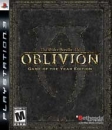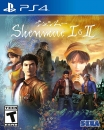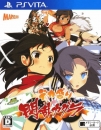For years, Japanese RPGs were one of the mainstays of the console scene. Although something of a niche genre during the 8-bit and 16-bit days, they exploded into the mainstream with the release of Squaresoft's Final Fantasy VII in 1997. The game would go on to sell nearly ten million copies worldwide, making it one of the most influential titles of all time. Riding it's coattails, other titles like Legend of Dragoon, Suikoden, Breath of Fire and Square's own Xenogears and Parasite Eve would carve out their own success stories. The jRPG appeared to be ascedent.
But somewhere along the way things went wrong. Subsequent Final Fantasy titles would sell less and less with the most recent Final Fantasy XII only selling 1.5 million copies in North America. A highly respectable amount by any measure, but a far cry from the glory days of the 32-bit era. And now in the HD gaming era it has been once again relegated to niche status with big budget titles like The Last Remnant, Star Ocean IV, Valkyria Chronicles and Infinite Undiscovery all selling in the meagre 100,000 unit range according to NPD. Only on the handheld systems can you find any jRPG success stories. So what happened?
Perhaps the phrase "jRPG" itself is symptomatic of the genre's decline. I can remember a time when jRPGs were simply called RPGs. The etymology of the term in mainstream gamer circles has it's roots in the rise of the western RPG and their stark differences to their eastern counterparts. Although always a popular genre on the PC, western RPGs did not gain prominence on consoles until last generation with titles like Fable, Elder Scrolls: Morrowind, and the Knights of the Old Republic series. The genre has been even more successful this generation. One need only look at the sales totals to see how mainstream the genre has become : Fallout 3 4.7 million , Fable 2 2.7 million, Mass Effect 2 million, even a poorly received title like Two Worlds was unexpectedly successful. On the surface, it appears that Western RPGs have inherited the mantle of mainstream sucess that jRPGs once held.
So why are western RPGs so successful while Japanese ones have not been? Have gamers' tastes changed? Have jRPGs changed? Or is the problem just with the specific JRPGs that have been released so far? Let's take a look at each of those questions.
Have gamers' tastes changed? For decades the gaming industry (at least on the console side) has been largely dominated by Japanese companies. Companies like Konami, Capcom, Namco and Squaresoft were the dominant publishers in the industry. An interesting phenomen this generation has been how quickly western companies have overtaken these former juggernauts. Capcom alone has reliably been able to find succcess, and even they have paled in comparison to the most successful western games like Grand Theft Auto, Halo, Call of Duty, and Bioshock. Cognizant of Japan's setting sun in game development clout, Square Enix President Yoichi Wada has announced what he called a "Square-Enix for the World" strategy with a heavy emphasis on games that they believe appeal to a Western audience. These efforts have no bared fruit however, with their two games developed under this philosophy (The Last Remnant and Infinite Undiscovery) being critical and financial failures.
So have modern gamers rejected jRPGS? Or are they just waiting for the right one? It's true that the flagship title of the jRPG genre Final Fantasy XIII has yet to be released. 1up's Garnett Lee has said on a recent episode of the ListenUP podcast that he believes jRPG developers have a tendency to wait until Square releases their next Final Fantasy which they proceed to liberally borrow elements from for their games. He went on to say that the recently released Star Ocean: The Last Hope was in many ways a ripoff of Final Fantasy X. It is true that jRPGs this generation for the HD consoles have been almost universally poorly reviewed. Interestingly, while many jRPGs on HD consoles have been more action-RPG oriented, some of the more traditional RPGs like the Final Fantasy remakes released on DS have actually been modestly successful. So is this a sign that by a fluke of history, we have just had a string of poor quality, action-oriented jRPGs release consectively but there is actually a fairly significant audience just waiting out there for a high quality traditional jRPG?
So perhaps we can say that jRPG themselves have changed? There is certainly much that can be said to support this arguement. It is perhaps difficult to put your finger on exactly what but there is little doubt that watching this cutscene from Star Ocean demonstrates a sharp contrast to the storytelling of games like Chrono Trigger or Final Fantasy VI. Posters having this very discussion on internet messageboard NeoGAFcomplain of games after the 32-bit generation traded their smart, moving stories and well-developed characters for whiny teenage protagonists and uninteresting anime archetypes. Others point out that too many of the games have been action-RPG oriented instead of the more strategic and cerebral combat systems of yesteryear. However, other posters say that the problems of the jRPG genre have been endemic to it for years. Things like random battles, lack of player choice and customization and heavily scripted storylines have been part and parcel of most JRPGs since the beginning.
I think it is reasonable to say that all of these factors play a part in the JRPG genre's decline. The JRPGs released thus far this generation have for the most part not been great examples of the genre. However, JRPGs have legitmately been out of touch with modern audiences and unable to capture the cultural zeitgeist for various reasons. Also, in the areas where JRPGs have changed from their more traditional brethren, it often hasn't been for the better. So what can be done? Are JRPGs doomed to eternal commercial failure and eventual extinction? I don't think so. In fact, I am personally optimistic for the future of genre and I think it's recent setbacks will make it stronger overall. Here are some things I would like to see jRPGs adopt to be able to reach a larger audience.
Choice: One of the most compelling things about western RPGs is their ability to let you create whatever kind of character you want and know that the choices you make will have make a real impact on the game. In Fallout 3 you can play as a paragon of decency, saving the innocent, and punishing the wicked; all while wearing a cowboy hat and using a six shooter. On the other hand, you can play as an evil, hand to hand combat expert, whose misanthropic tendencies endanger the entire Capital Wasteland. And you know the really amazing part? The game plays completely differently based on the type of character you choose to play as. That's right, actual role-playing in an RPG.
Mature, Interesting Storylines: Let's give up the immature teenagers and the generic "save the world" storylines. There was a time when JRPGs could actually spin a really good yarn. Take Chrono Trigger for example, it had great characters that you actually cared about, a fascinating and unique villain, and a well-written storyline that sucked you in from beginning to end. Or how about Final Fantasy VII? Although the game has it's detractors, discussion of it's storyline still lights up messageboards to this very day and it's characters are amongst the most popular in any game ever. In fact it's villain, Sephiroth, is possibly the single most popular villain ever.
Games Don't Need to be 100 Hours!: jRPGs these days tend to pad their games out with dozens of hours of boring dungeon crawls and fetch quests. The very best examples of the genre can almost all be beaten in around 30 hours or less. Somewhere along the way jRPG developers got the idea that "100 hours of gameplay!" made a good bulletpoint on the back of the box. But as the gaming audience has grown older, they have less free time and want a more tightly paced experience. Western RPGs get this, and at the same time offer side quests that can extend the gameplay nearly indefinitely. This is the model jRPGs need to adopt if they are going to be successful again.
JRPGs were once the hottest thing going in videogames and it is possible for them to get there once again. They just need to learn to appeal to more than just an increasingly small circle of hardcore otaku and jRPG loyalists. If they can do the things on this list and once again recapture the favor of public opinion, there should be no doubt there we will see another Final Fantasy VII-level success in our lifetimes.
This should be good news for JRPG fans. BTW, he is not saying JRPGs should become WRPGs, he is just saying that they should include more elements from them to gain more sales. WRPGs are successful for a reason or ten.





























































